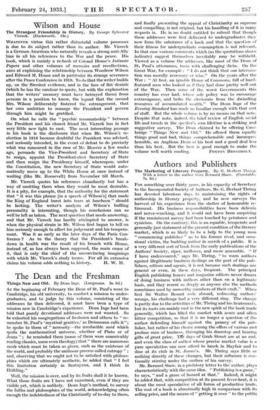Wilson and House
The Strangest Friendship in History. By George Sylvester Viereck. (Duckworth. 18s.)
WHATEVER virtue this *rather distasteful volume possesses is due to its subject rather than its author. Mr. Viereck is a German American who naturally reveals a strong anti-Ally biaS in all his references to the War and the peace. His book, which is mainly a re-hash of Colonel House's Intimate Papers and other volumes of memoirs and recollections, aims at explaining the relationship between Woodrow Wilson and Edward M. House and in particular its strange severance after the Peace Conference in 1919. To do that the writer builds up, 'on the flimsiest evidence, and in the face of flat denials (which lie has the candour to quote, but with the explanation that the writers' memory must have betrayed them) from perions in a position to know, the legend that the second Mis. Wilson' deliberately fostered the estrangement, that her own ambition to manage the President and govern through him might be gratified.
On what he calls the " psychic messmateship " between the President and his closest friend Mr. Viereck has in fact very little new light to cast. The most interesting passage in his book is the disclosure that when Mr. Wilson's re- election in 1916 became doubtful the President was advised; and seriously-intended, in the event of defeat to do precisely what was rumoured in the case of Mr. Hoover a few weeks ago, persuade the Vice-President and Secretary of State to resign, appoint the President-elect Secretary of State and then resign the Presidency himself, whereupon, under the Constitution, the new Secretary of State would auto- matically move up to the White House at once instead of waiting (like Mr. Roosevelt) from November till March.
Mi. Viereck quotes his references abundantly but has a way of omitting them when they would be most desirable. It is a pity, for example, that the authority for the statement that " it was this phrase [in a speech of, Wilson's] that made the King of England burst into tears at luncheon " should be lacking. The writer's analysis of .Wilson's baffling personality Is interesting, though his conclusions can as well be left as taken. The next question that needs answering, and that Mr. Viereck has hardly attempted to answer, is when the physical strain in Mr. Wilson first began to tell on him seriously enough to affect his judgement and his tempera- ment. Was it as early as the later days of the Paris Con- ference ? As to the theory that the President's break- down in health was the result of his breach with House, instead of, as has always been supposed, the main cause of it, that is only the chief of the unconvincing imaginings with which Mr. Viereek's study teems. For all its extensive
claims his volume adds nothing to history. H. W. H.






































 Previous page
Previous page